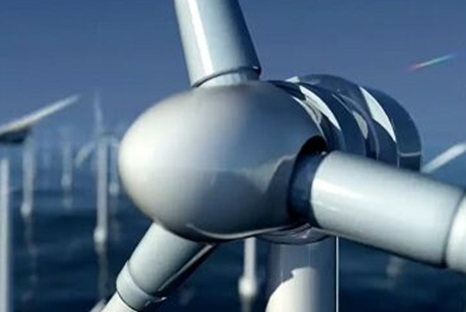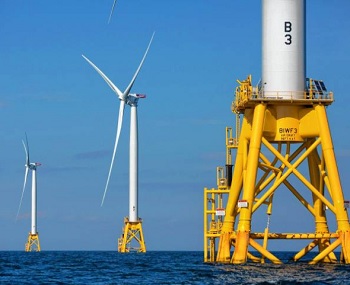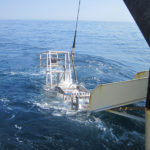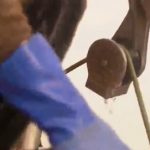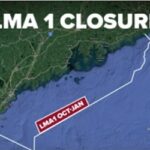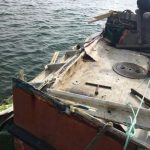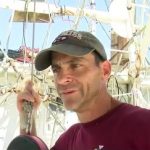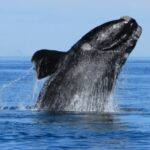Tag Archives: New England Fishermen’s Stewardship Association
Anti-offshore wind fishing group backed by right-wing money eyes support from Maine towns
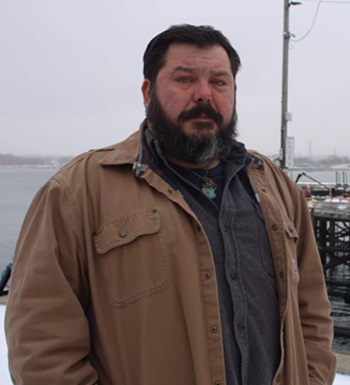 Since its founding three years ago, the New England Fishermen’s Stewardship Association has been a vocal opponent of offshore wind and relied on funding from a right-wing advocacy group connected to one of the most influential conservative activists in the U.S. Now, the fishermen’s organization known as NEFSA is looking to diversify its revenue sources by asking coastal communities in Maine for financial support. Jerry Leeman is the founder and CEO of NEFSA. And for the past three years he’s been the star of an advocacy campaign that’s led him up and down the northeast coast to preach against offshore wind. Leeman and NEFSA have been making some noise. more, >>CLICK TO READ<< 07:23
Since its founding three years ago, the New England Fishermen’s Stewardship Association has been a vocal opponent of offshore wind and relied on funding from a right-wing advocacy group connected to one of the most influential conservative activists in the U.S. Now, the fishermen’s organization known as NEFSA is looking to diversify its revenue sources by asking coastal communities in Maine for financial support. Jerry Leeman is the founder and CEO of NEFSA. And for the past three years he’s been the star of an advocacy campaign that’s led him up and down the northeast coast to preach against offshore wind. Leeman and NEFSA have been making some noise. more, >>CLICK TO READ<< 07:23
New lobster minimum catch sizes could lead to industry change, Golden reacts DMR decision
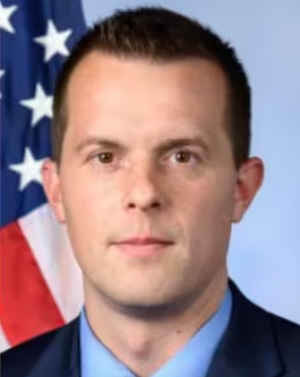 A potential change to the lobster industry would impact the allowable lobster catch size. Dozens of lobstermen who do not support the change spoke out at a Department of Marine Resources public hearing in Augusta on Thursday night. The public hearing discussed a proposal that would change the minimum allowable catch size for lobsters from 3 1/4 inches to 3 5/16 inches. A change of 1/16 of an inch may seem small, but to fishermen, it’s a big deal. “It’s our livelihoods you’re messing with,” lobsterman Wayne Delano said. “The question here is not will lobstermen and processors go out of business because of this increase, but rather how many will be put out of business because of this increase,” said Dustin Delano, lobsterman and chief operating officer at the New England Fishermen’s Stewardship Association. more, >>CLICK TO READ<< 08:35
A potential change to the lobster industry would impact the allowable lobster catch size. Dozens of lobstermen who do not support the change spoke out at a Department of Marine Resources public hearing in Augusta on Thursday night. The public hearing discussed a proposal that would change the minimum allowable catch size for lobsters from 3 1/4 inches to 3 5/16 inches. A change of 1/16 of an inch may seem small, but to fishermen, it’s a big deal. “It’s our livelihoods you’re messing with,” lobsterman Wayne Delano said. “The question here is not will lobstermen and processors go out of business because of this increase, but rather how many will be put out of business because of this increase,” said Dustin Delano, lobsterman and chief operating officer at the New England Fishermen’s Stewardship Association. more, >>CLICK TO READ<< 08:35
With right-wing backing, New England offshore wind opponents gain strength
 Jerry Leeman III is a fifth generation Maine fisherman and looks the part: broad shoulders, muscular hands, scraggly black beard with streaks of gray. Sitting at the head of an empty boardroom table in his South Portland office, he rails against the buildout of offshore wind currently getting underway in the Northeast. Leeman has read the government’s environmental assessments, and he’s heard scientific experts say turbines won’t destroy the marine ecosystem — but he doesn’t trust them. Plenty of fishermen in the Northeast feel they’re being squeezed out of existence by federal regulations and offshore wind development. But Leeman has a bigger platform than most. He founded and now leads the New England Fishermen’s Stewardship Association, better known as NEFSA. more, >>CLICK TO READ<< 06:18
Jerry Leeman III is a fifth generation Maine fisherman and looks the part: broad shoulders, muscular hands, scraggly black beard with streaks of gray. Sitting at the head of an empty boardroom table in his South Portland office, he rails against the buildout of offshore wind currently getting underway in the Northeast. Leeman has read the government’s environmental assessments, and he’s heard scientific experts say turbines won’t destroy the marine ecosystem — but he doesn’t trust them. Plenty of fishermen in the Northeast feel they’re being squeezed out of existence by federal regulations and offshore wind development. But Leeman has a bigger platform than most. He founded and now leads the New England Fishermen’s Stewardship Association, better known as NEFSA. more, >>CLICK TO READ<< 06:18
Trump has vowed to kill US offshore wind projects. Will he succeed?
 Opponents of offshore wind energy projects expect President-elect Donald Trump to kill an industry he has vowed to end on the first day he returns to the White House. “I believe this is a tipping point for the offshore wind industry in America,” said Robin Shaffer, president of Protect Our Coast NJ, one of the most vocal groups opposing offshore wind on the East Coast. “They have been given a glidepath by Democrat-run administrations at the federal and state level for many years. For this industry, (Tuesday’s) results will bring headwinds far greater than they have faced previously.” Commercial fishermen in Maine said they hope the Trump administration will undo policies designed to help build and approve offshore wind projects, saying regulators attempted to “future-proof” the industry against political change. Jerry Leeman, CEO of the New England Fishermen’s Stewardship Association, called on Trump to reverse a commitment to deploy 30 gigawatts of offshore wind by 2030. more, >>CLICK TO READ<< 06:37
Opponents of offshore wind energy projects expect President-elect Donald Trump to kill an industry he has vowed to end on the first day he returns to the White House. “I believe this is a tipping point for the offshore wind industry in America,” said Robin Shaffer, president of Protect Our Coast NJ, one of the most vocal groups opposing offshore wind on the East Coast. “They have been given a glidepath by Democrat-run administrations at the federal and state level for many years. For this industry, (Tuesday’s) results will bring headwinds far greater than they have faced previously.” Commercial fishermen in Maine said they hope the Trump administration will undo policies designed to help build and approve offshore wind projects, saying regulators attempted to “future-proof” the industry against political change. Jerry Leeman, CEO of the New England Fishermen’s Stewardship Association, called on Trump to reverse a commitment to deploy 30 gigawatts of offshore wind by 2030. more, >>CLICK TO READ<< 06:37
Maine Unions Lead on the Green Energy Transition
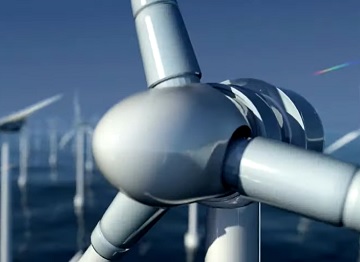 Maine’s fifteen years long OSW policy debates have been hobbled by entrenched opposition from Maine’s lobstermen. It would also be impossible to convince politicians to pass an OSW law that was oblivious to the interests of Maine’s lobstermen. Governor Mills and her team reached out to Maine Lobstermen’s Association (MLA), but they did not break through the impasse. The MLA continues to oppose OSW by arguing about potential impacts “on the marine environment, commercial fishermen and our fishing heritage.” MLA’s opposition has grown stronger in the past few years under the influence of New England Fishermen’s Stewardship Association (NEFSA), which is orchestrating conservative anti-OSW campaigns across the East Coast. To break this logjam, the MLCC worked with the country’s only lobstering union, Lobster 207. Though a small fraction of Maine lobster fishers are unionized, the lobstering union has a crucial role in advocating for improved working conditions within the lobstering industry. more, >>CLICK TO READ<< 08:50
Maine’s fifteen years long OSW policy debates have been hobbled by entrenched opposition from Maine’s lobstermen. It would also be impossible to convince politicians to pass an OSW law that was oblivious to the interests of Maine’s lobstermen. Governor Mills and her team reached out to Maine Lobstermen’s Association (MLA), but they did not break through the impasse. The MLA continues to oppose OSW by arguing about potential impacts “on the marine environment, commercial fishermen and our fishing heritage.” MLA’s opposition has grown stronger in the past few years under the influence of New England Fishermen’s Stewardship Association (NEFSA), which is orchestrating conservative anti-OSW campaigns across the East Coast. To break this logjam, the MLCC worked with the country’s only lobstering union, Lobster 207. Though a small fraction of Maine lobster fishers are unionized, the lobstering union has a crucial role in advocating for improved working conditions within the lobstering industry. more, >>CLICK TO READ<< 08:50
Against the Wind: Questions About BOEM’s Fisheries Analysis
 The Bureau of Ocean Energy Management (BOEM) announced the final sale notice for the Gulf of Maine offshore wind project lease areas on Sept. 16. The agency shrunk the overall area by 120,000 acres, removing significant portions of the two northern leases off the coast of Maine, carving a transit lane between the two farthest-offshore southern areas, and shaving small portions off other southern areas. This decision did little to satisfy Jerry Leeman, a Harpswell, Maine-based former commercial fisherman and founder of the New England Fishermen’s Stewardship Association (NEFSA), an organization that opposes the Gulf of Maine offshore wind area. NEFSA “remains steadfast in its opposition,” wrote Leeman in a press release, “despite the shrinking of the original areas.” more, >>CLICK TO READ<< 06:22
The Bureau of Ocean Energy Management (BOEM) announced the final sale notice for the Gulf of Maine offshore wind project lease areas on Sept. 16. The agency shrunk the overall area by 120,000 acres, removing significant portions of the two northern leases off the coast of Maine, carving a transit lane between the two farthest-offshore southern areas, and shaving small portions off other southern areas. This decision did little to satisfy Jerry Leeman, a Harpswell, Maine-based former commercial fisherman and founder of the New England Fishermen’s Stewardship Association (NEFSA), an organization that opposes the Gulf of Maine offshore wind area. NEFSA “remains steadfast in its opposition,” wrote Leeman in a press release, “despite the shrinking of the original areas.” more, >>CLICK TO READ<< 06:22
Fishermen Fight for Their Livelihoods Against Wind Farm Project in New England
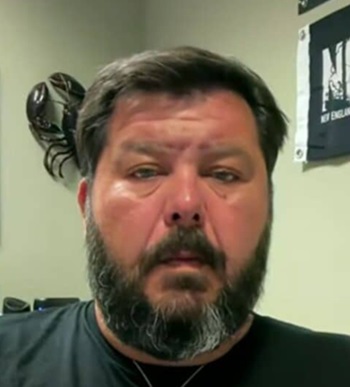 In a recent interview with Fox Business, Jerry Leeman, CEO of the New England Fishermen’s Stewardship Association, expressed his deep concerns about the impact of a wind farm project off the coast of Nantucket on the livelihoods of local fishermen. The discussion, hosted by Dagen McDowell and Sean Duffy on “The Bottom Line,” highlighted the growing tension between environmental initiatives and the preservation of traditional industries like fishing. Leeman opened the conversation by addressing what he described as “greenwashing,” a term used to suggest that the wind farm project is being marketed as environmentally friendly while ignoring the negative consequences. “We have been greenwashed into thinking this is a good idea,” Leeman stated. He explained that the construction and operation of wind turbines are displacing vital fish stocks and creating dangerous debris fields that could threaten the safety of fishermen. Photos, more, >>CLICK TO READ<< 14:50
In a recent interview with Fox Business, Jerry Leeman, CEO of the New England Fishermen’s Stewardship Association, expressed his deep concerns about the impact of a wind farm project off the coast of Nantucket on the livelihoods of local fishermen. The discussion, hosted by Dagen McDowell and Sean Duffy on “The Bottom Line,” highlighted the growing tension between environmental initiatives and the preservation of traditional industries like fishing. Leeman opened the conversation by addressing what he described as “greenwashing,” a term used to suggest that the wind farm project is being marketed as environmentally friendly while ignoring the negative consequences. “We have been greenwashed into thinking this is a good idea,” Leeman stated. He explained that the construction and operation of wind turbines are displacing vital fish stocks and creating dangerous debris fields that could threaten the safety of fishermen. Photos, more, >>CLICK TO READ<< 14:50
Fishing Flotilla Protests at Still-Damaged Vineyard Wind Turbine as Debris Continues to Wash Ashore
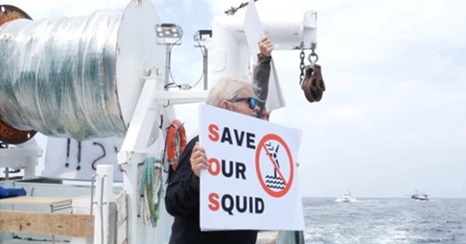 A flotilla of fishermen from across the East Coast gathered yesterday near the site of a damaged Vineyard Wind turbine to protest the perceived risks posed by offshore wind projects to the ocean and maritime communities. The protest, which also included a “Hands Across the Beach” demonstration on shore, highlighted growing concerns among fishermen about the impact of large-scale wind farms on their livelihoods and the environment. Vineyard Wind, which has been constructing towering turbine structures off the coast, has faced increasing criticism from local fishing communities. The concerns have escalated following a turbine blade failure in July that left fiberglass debris in the surrounding waters. more, >>CLICK TO READ<< 09:53
A flotilla of fishermen from across the East Coast gathered yesterday near the site of a damaged Vineyard Wind turbine to protest the perceived risks posed by offshore wind projects to the ocean and maritime communities. The protest, which also included a “Hands Across the Beach” demonstration on shore, highlighted growing concerns among fishermen about the impact of large-scale wind farms on their livelihoods and the environment. Vineyard Wind, which has been constructing towering turbine structures off the coast, has faced increasing criticism from local fishing communities. The concerns have escalated following a turbine blade failure in July that left fiberglass debris in the surrounding waters. more, >>CLICK TO READ<< 09:53
Maine lobstermen will not be scapegoated over right whale
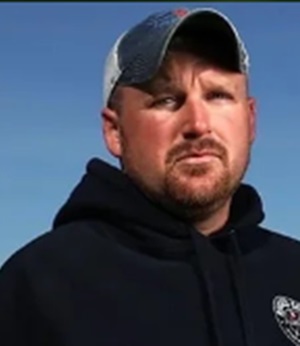 New England fishermen are bracing themselves for another salvo of regulation and activist pressure after the tragic entanglement death of a right whale that washed ashore on Martha’s Vineyard. While the future of our fisheries is uncertain, 2023 showed how much resilience and determination there is in our maritime communities. My organization – the New England Fishermen’s Stewardship Association – and our many partners are prepared to ward off any attempt to scapegoat Maine lobstermen for the declining population of the majestic right whale. Regulators and out-of-state agitators are together impugning one of the most sustainable fisheries in the world for right whale deaths. Their claims are baseless and contradicted by their own data. As agencies and NGOs ponder next steps, they might consider the fighting spirit this last year has showcased among fishermen. more, >>click to read<< by Dustin Delano 12:06
New England fishermen are bracing themselves for another salvo of regulation and activist pressure after the tragic entanglement death of a right whale that washed ashore on Martha’s Vineyard. While the future of our fisheries is uncertain, 2023 showed how much resilience and determination there is in our maritime communities. My organization – the New England Fishermen’s Stewardship Association – and our many partners are prepared to ward off any attempt to scapegoat Maine lobstermen for the declining population of the majestic right whale. Regulators and out-of-state agitators are together impugning one of the most sustainable fisheries in the world for right whale deaths. Their claims are baseless and contradicted by their own data. As agencies and NGOs ponder next steps, they might consider the fighting spirit this last year has showcased among fishermen. more, >>click to read<< by Dustin Delano 12:06
Greenlaw joins NEFSA board of directors
 Maine fisherman Linda Greenlaw has joined the New England Fishermen’s Stewardship Association’s board, “the only fishing organization I have been involved with,” she said Dec. 8 on Facebook while fishing off Isle au Haut. I … was so impressed with [CEO and founder Jerry Leeman’s] knowledge and logic and articulation of the issues and fisheries in general, with his experience as a fisherman who knows the industry being the leader and voice,” she added. more, >>click to read<< `12:53
Maine fisherman Linda Greenlaw has joined the New England Fishermen’s Stewardship Association’s board, “the only fishing organization I have been involved with,” she said Dec. 8 on Facebook while fishing off Isle au Haut. I … was so impressed with [CEO and founder Jerry Leeman’s] knowledge and logic and articulation of the issues and fisheries in general, with his experience as a fisherman who knows the industry being the leader and voice,” she added. more, >>click to read<< `12:53
Biden admin’s new rule could put pinch on lobster fishermen while letting others off the hook: critics say
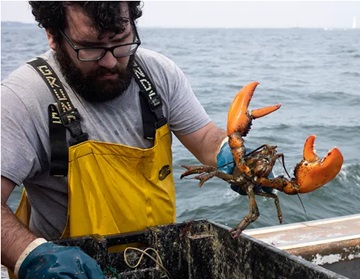 The National Oceanic and Atmospheric Administration is planning to enact a new federal rule under the Marine Mammal Protection Act – which would expand an existing restricted area off the coast of Maine where lobster fishing is already banned for three months each year. The move would cut the lobstermen’s’ business by at least 25% of the already declining industry, critics say. The plans come as an attempt to protect the endangered North Atlantic Right Whale, but a group of fishermen say the agency have no data to support the tightening restrictions. They also claim the federal agency is playing favorites by greenlighting offshore wind developments even though recent studies show can be harmful to marine life. “The federal government treats foreign offshore wind developers much better than lobstermen. The corporations have official authorization to disturb and displace marine life. Working lobstermen aren’t as lucky as our friends,” Video, >>click to read<< 07:55
The National Oceanic and Atmospheric Administration is planning to enact a new federal rule under the Marine Mammal Protection Act – which would expand an existing restricted area off the coast of Maine where lobster fishing is already banned for three months each year. The move would cut the lobstermen’s’ business by at least 25% of the already declining industry, critics say. The plans come as an attempt to protect the endangered North Atlantic Right Whale, but a group of fishermen say the agency have no data to support the tightening restrictions. They also claim the federal agency is playing favorites by greenlighting offshore wind developments even though recent studies show can be harmful to marine life. “The federal government treats foreign offshore wind developers much better than lobstermen. The corporations have official authorization to disturb and displace marine life. Working lobstermen aren’t as lucky as our friends,” Video, >>click to read<< 07:55
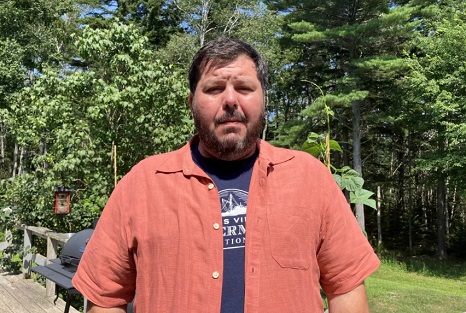
Harpswell fishing advocate battles winds of change
Harpswell resident Jerry Leeman III sits in an office chair at a dining room table with his father, Jerry Leeman Jr., on a nearby couch watching TV. In front of Leeman III is a laptop and a stack of studies and reports on a range of issues that could threaten the New England fishing industry. Leeman, like his father, used to be a commercial fisherman. Now he spends his days reading reports and constructing arguments against what he sees as challenges to the industry, while advocating for his fellow New England fishermen and their interests. Having recently harpooned the whale conservationists in court, the New England fishing industry’s current biggest threat, in Leeman’s view, is the advent of floating offshore wind power and its planned deployment along the New England coast. >>click to read<< 12:17
Fishermen slam Biden admin’s offshore wind push as threat to jobs, sea life
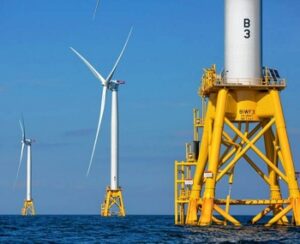 The New England Fishermen’s Stewardship Association (NEFSA) on Monday released an Offshore Wind Research Summary, a compilation of scholarly articles that identify dangers offshore wind farms pose to ocean ecosystems. “We cannot industrialize the Gulf of Maine until we understand how the wind industry interacts with the fisheries that wild harvesters have stewarded responsibly for decades,” said Jerry Leeman, NEFSA CEO and a longtime commercial fishing captain. Leeman says that the government’s attempt to justify wind farms leans on “voodoo science” because the proper methods and sufficient amount of time have not been applied. “The problem is the science that wraps around the science, the whole purpose for it is misinterpreted to the public through the fact that they think they’re getting real, accurate science,” Leeman said. >click to read<
The New England Fishermen’s Stewardship Association (NEFSA) on Monday released an Offshore Wind Research Summary, a compilation of scholarly articles that identify dangers offshore wind farms pose to ocean ecosystems. “We cannot industrialize the Gulf of Maine until we understand how the wind industry interacts with the fisheries that wild harvesters have stewarded responsibly for decades,” said Jerry Leeman, NEFSA CEO and a longtime commercial fishing captain. Leeman says that the government’s attempt to justify wind farms leans on “voodoo science” because the proper methods and sufficient amount of time have not been applied. “The problem is the science that wraps around the science, the whole purpose for it is misinterpreted to the public through the fact that they think they’re getting real, accurate science,” Leeman said. >click to read<
Fishermen’s Alliance Highlights Offshore Wind Threat to Haddock, Lobster Fisheries in Gulf of Maine
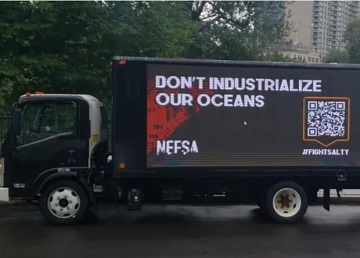 An alliance of groups representing New England’s fishermen is highlighting scientific research that suggests offshore wind development could have “population-scale effects” on key fish and crustacean species in the Gulf of Maine, including electromagnetism-induced deformities in lobsters. The New England Fishermen’s Stewardship Association (NEFSA) on Monday released an “Offshore Wind Research Summary” summarizing the existing scientific research on the environmental impact of offshore wind power development. The scientific evidence, they believe, shows that offshore wind development would have unpredictable and potentially harmful consequences for key marine species, such as lobster and haddock. >click to read< 17:37
An alliance of groups representing New England’s fishermen is highlighting scientific research that suggests offshore wind development could have “population-scale effects” on key fish and crustacean species in the Gulf of Maine, including electromagnetism-induced deformities in lobsters. The New England Fishermen’s Stewardship Association (NEFSA) on Monday released an “Offshore Wind Research Summary” summarizing the existing scientific research on the environmental impact of offshore wind power development. The scientific evidence, they believe, shows that offshore wind development would have unpredictable and potentially harmful consequences for key marine species, such as lobster and haddock. >click to read< 17:37
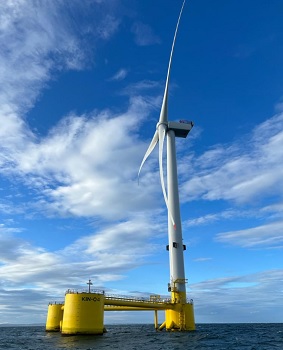
Leeman: Maine must hit pause on offshore wind turbines
You wouldn’t buy a house without an inspection, so why would we fill the Gulf of Maine with wind turbine superstructures without understanding how they interact with the marine environment? Offshore wind energy features too many unknowns to proceed at this point with widescale ocean industrialization. That’s why my organization, the New England Fishermen’s Stewardship Association (NEFSA) has joined with partner organizations to call on state and federal authorities to reset our renewable energy policy. The state of Maine is developing a floating offshore wind research array at a 15-square-mile site in the Gulf of Maine. >click to read< 08:17






